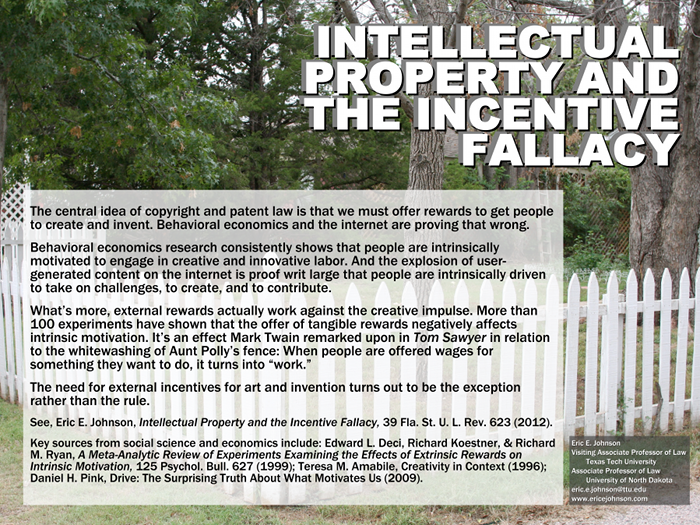Intellectual Property and the Incentive Fallacy
poster presented at the AALS Annual Meeting, sponsored by the Committee on Sections and Annual Meeting, New Orleans, Louisiana, January 5-6, 2013
Text, photo, and graphic design by Eric E. Johnson.
The text of the poster:
The central idea of copyright and patent law is that we must offer rewards to get people to create and invent. Behavioral economics and the internet are proving that wrong.
Behavioral economics research consistently shows that people are intrinsically motivated to engage in creative and innovative labor. And the explosion of user-generated content on the internet is proof writ large that people are intrinsically driven to take on challenges, to create, and to contribute.
What's more, external rewards actually work against the creative impulse. More than 100 experiments have shown that the offer of tangible rewards negatively affects intrinsic motivation. It's an effect Mark Twain remarked upon in Tom Sawyer in relation to the whitewashing of Aunt Polly's fence: When people are offered wages for something they want to do, it turns into "work."
The need for external incentives for art and invention turns out to be the exception rather than the rule.
See, Eric E. Johnson, Intellectual Property and the Incentive Fallacy, 39 Fla. St. U. L. Rev. 623 (2012).
Key sources from social science and economics include: Edward L. Deci, Richard Koestner, & Richard M. Ryan, A Meta-Analytic Review of Experiments Examining the Effects of Extrinsic Rewards on Intrinsic Motivation, 125 Psy- Chol. Bull. 627 (1999); Teresa M. Amabile, Creativity in Context (1996); Daniel H. Pink, Drive: The Surprising Truth About What Motivates Us (2009).
Eric E. Johnson
Visiting Associate Professor of Law
Texas Tech University
Associate Professor of Law
University of North Dakota
eric.e.johnson@ttu.edu
www.ericejohnson.com
Copyright 2013 Eric E. Johnson. All rights reserved. Konomark: Most rights sharable.


